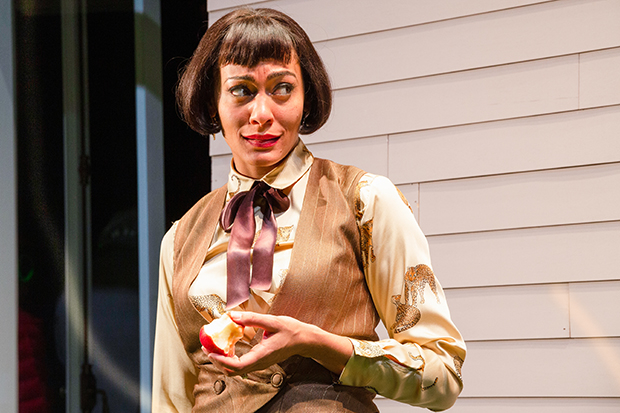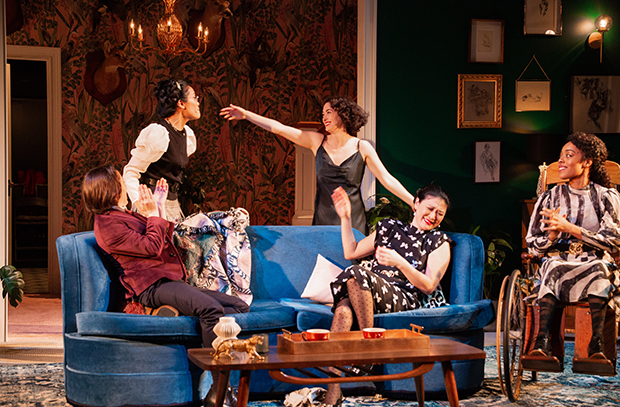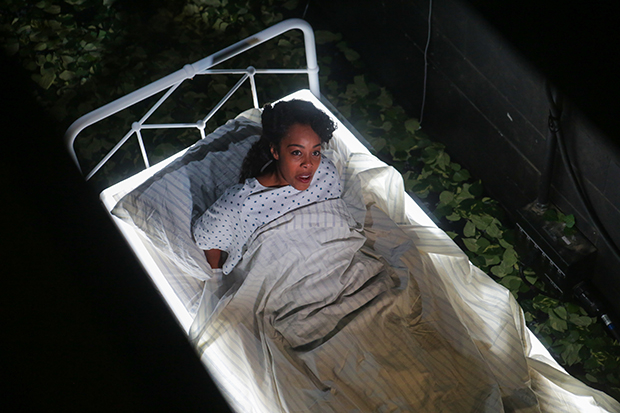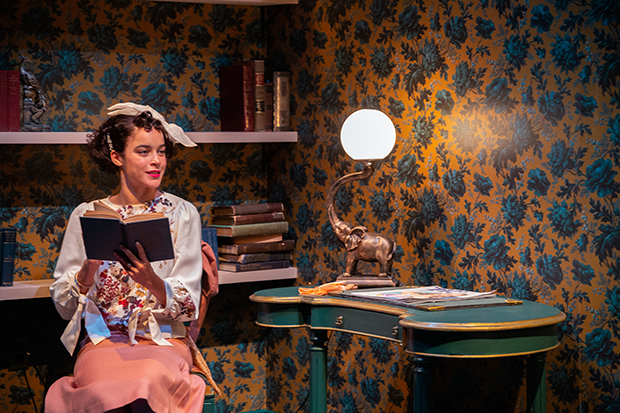Fefu and Her Friends: Can Misogyny Exist in a Play Without Any Men?
Theatre for a New Audience stages the first off-Broadway revival of María Irene Fornés’s masterwork.

(© Henry Grossman)
"My husband married me to have a constant reminder of how loathsome women are," the title character says in the first line of María Irene Fornés's Fefu and Her Friends, now flourishing in a revival at Theatre for a New Audience. It's a startling overture, but Fefu makes it clear with every word and pose that she really doesn't care if you think she is loathsome, as long as you're thinking about her. Lileana Blain-Cruz directs the production (the first major one in New York since its 1978 debut) with a steady hand and boundless style. Even if you walk away feeling like you don't fully understand everything in the play — I certainly don't — you know that something vital is happening and you cannot look away.
The event of the play is ostensibly a gathering of eight women. They are meeting to rehearse a charity fundraiser in spring of 1935, but they don't get around to any rehearsal until the third act; and even then, it is a pitiful excuse for a run-through. Fornés dedicates the first two acts to introducing the characters and the things that drive their behavior.

(© Henry Grossman)
There's the eccentric Fefu (Amelia Workman), who fixes her own plumbing and likes to play a game in which she aims a shotgun at her husband and pretends to shoot him dead (despite the loud bang and smell of gunpowder, we are assured she is only shooting blanks). Christina (a reserved Juliana Canfield) is horrified, but Cindy (Jennifer Lim) is impressed by Fefu's uniqueness. When Julia (Brittany Bradford) arrives, conversation turn to her tragic backstory: Following a hunting accident, she is now wheelchair-bound, despite not having anything physically wrong with her. When Emma (a gloriously grand Helen Cespedes) arrives, she steals the spotlight by riding around on Julia's lap, looking like a trophy handed out to top Emirates flight attendants.
In Act 2, the audience separates into four groups and travels around Fefu's funhouse to witness more intimate scenes among the women. Fefu plays an erotically charged game of croquet with Emma. Paula (Lindsay Rico) has an emotional reunion with Cecilia (Carmen Zilles), while Sue (Ronete Levenson) makes soup for Julia. Christina and Cindy chat in the study. We are even made privy to one of Julia's hallucinations, which we view from above as she writhes in a bed underneath a glass floor — or glass ceiling, in her case.

(© Gerry Goodstein)
The scenes play out simultaneously, with the louder lines of each segment audible in the other rooms. Blain-Cruz masterfully conducts this fugue with great care for synchrony and dynamics. As Fefu, Workman is the principal soloist: Her voice rings out over the stage, demanding and receiving our attention.
Although Blain-Cruz has directed the cast to natural performances, she maintains the strangeness of the play through the design, which is a glossy photo shoot come to life. Every detail is considered on Adam Rigg's set, from the period appliances to the loud wallpaper to the pineapple-themed chandelier. It all looks great under Jane Cox's impressive lighting. Fruit and animal themes appear throughout, making Fefu's house look like a chintzy jungle, in which she is the apex predator. Montana Levi Blanco costumes her in striped tan trousers with a matching waistcoat, like she's on a fashion safari. Hair and makeup designer Cookie Jordan gives her severe eyeliner with a black bob. The look is striking and vaguely intimidating. We can't take our eyes off her.

(© Henry Grossman)
The other women are not nearly so commanding: Zilles is adorably bashful as Cecilia, and Rico carries a cloud of gloom around her as Paula. Despite Julia's tragic state, Bradford never asks for pity in her performance, which is Cassandra-like: She's a prophet who no longer attempts to be understood. In her monologue (which is delivered via headset in Palmer Hefferan's intimate sound design), she seems to be struggling with invisible captors who force her to recite a misogynistic prayer. To her horror, those captors are particularly interested in Fefu.
Of all the messages in this enduringly mysterious play, this one comes across the clearest: In a world designed by and for men, there is little room for powerful, self-possessed women. Julia's captors hate Fefu because she unapologetically takes up space in this world. Fefu takes aim at the patriarchy and she shoots to kill — even when other women fall in her friendly fire. Four decades after it debuted, Fefu still hits us like a shot between the eyes.








